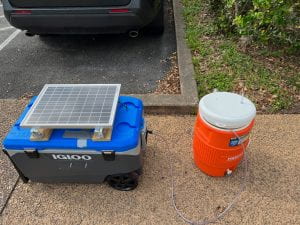Hello! My name is Ajay Kumar and I’m a Rice360 intern this year. I’m a rising senior from Will Rice College majoring in Biochemistry and Cell Biology with minors in Global Health Technologies and Statistics on the pre-med track.
My first week in the internship has been amazing! While I was very excited to have the opportunity to participate in the program, I have to admit that I was also a little nervous. In fact, it wasn’t until the summer before my junior year that I realized I wanted to pursue a minor in Global Health Technologies. With essentially no experience in engineering design, I felt as though I may be a little out of my depths. But, through my experiences at Rice and in the minor, I became passionate about addressing global health design challenges so that high-quality healthcare can be accessible in low-resource countries and I knew this internship would give me invaluable experience in that space.
We spent the first day of the internship doing orientation and learning more about the projects available this summer. It was hard figure out which project I wanted to spend my summer working on because they all seemed so cool and impactful. Each presented its own unique design challenge that I could imagine myself trying to tackle. After spending so much time trying to make up my mind, I was really happy to be assigned to the EPIWATER project. My teammates, Esther and Emily, are very smart and talented and I’m very excited to get to work with them over the next 7 weeks.
The EPIWATER project is an automatic wastewater sampler developed by a senior design team last year that collects and stores samples from local wastewater infrastructure which can then be processed and tested in a lab in order to detect and surveil the prevalence of a disease on the community level; for the scope of this project, the samples would be tested for SARS-CoV-2 (this inspired our team name: COVID-Cooler). Our team’s goal is to refine the design so that a functioning prototype can be sent to Nigeria for deployment. This project was super appealing to me because of the opportunity to collaborate with international partners and implement our prototype for field testing in Nigeria. In addition it covers a diverse range of design challenges, from mechanical engineering and electronics to public health and microbiology, which presents a challenging opportunity for me to contribute my skills as a non-engineer while being able to learn new skills from my peers. 
Throughout the week, our team focused on learning more about the context of the problem we are trying to address. This involved exploring documentation from the past team, meeting with our mentors, Mr. Casserly and Dr. Achi, and doing research of our own. We even got to see the current prototype and figure out how it works. Our mentors have been an incredible resource to our team as they really helped us understand the scope of the problem we are trying to address. We learned that Nigeria currently has no system established to conduct wastewater epidemiology, which is a useful technique to enhance the testing capacity for the country. Samples must be collected periodically and aggregated over time and then stored in a temperature-controlled environment so the virus doesn’t degrade before it can be tested. Our clients shared that they would like a prototype that is portable and rugged so it can transported between sampling sites, and that design changes must be made to protect the interior circuitry and improve the form factor and user interface of the prototype. In examining the prototype, we also discovered more challenges relating to the water collection process.
We plan to continue having discussions with mentors and experts involved with this project so that we can better define our design criteria and begin brainstorming solutions. I can’t wait for the next phases of the project and I’m so excited to see what our team accomplishes this summer
